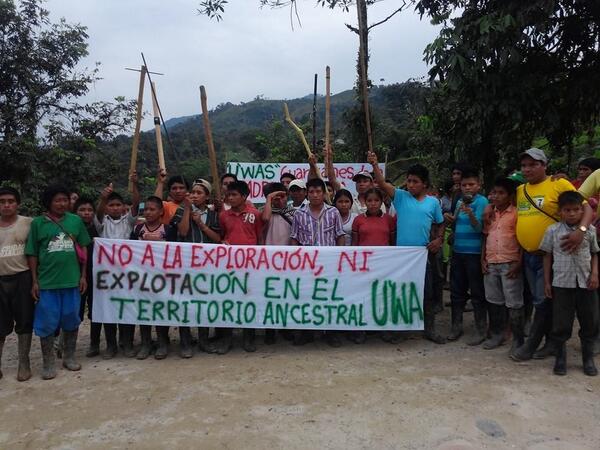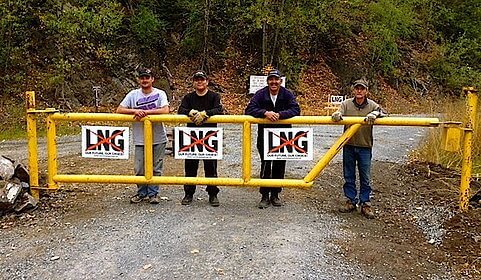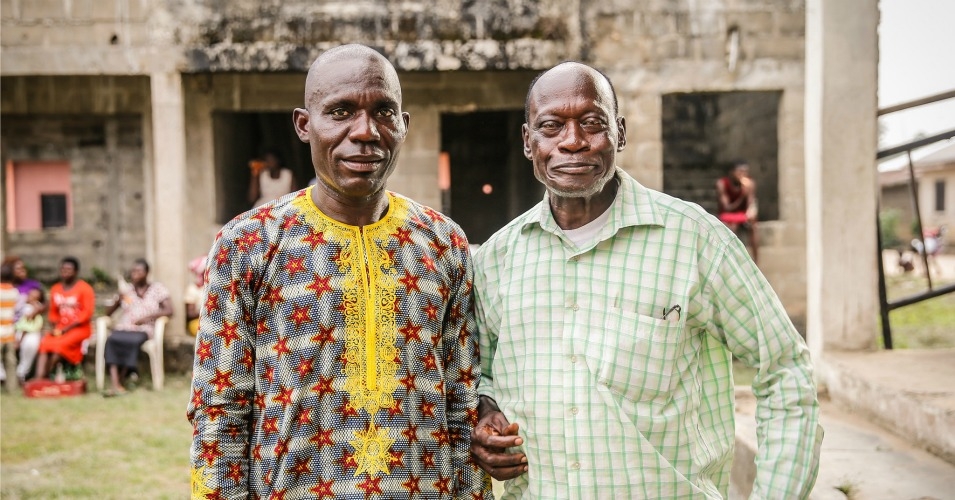
by DGR Colorado Plateau | Dec 26, 2015 | Lobbying, Toxification
Featured Image: Alali Efanga & Chief Fidelis Oguru from Oruma, two plaintiffs in the Dutch court case against Shell. (Photo: Milieudefensie/flickr)
In a potentially precedent-setting ruling, a Dutch court said Friday that Royal Dutch Shell may be held liable for oil spills at its subsidiary in Nigeria—a win for farmers and environmentalists attempting to hold the oil giant accountable for leaks, spills, and widespread pollution.
The ruling by the Court of Appeals in the Hague, which overturns a 2013 decision in favor of Shell, allows four Nigerian farmers to jointly sue the fossil fuels corporation in the Netherlands for causing extensive oil spills in Nigeria.
The scars of those disasters are still visible in the fields and fishing ponds of three Nigerian villages. In one village, drinking water has been rendered non-potable, while in another, an entire mangrove forest has been destroyed.
Alali Efanga, one of the Nigerian farmers who, along with Friends of the Earth Netherlands, brought the case against Shell, said the ruling “offers hope that Shell will finally begin to restore the soil around my village so that I will once again be able to take up farming and fishing on my own land.”
Beyond that, the court’s decision “is a landslide victory for environmentalists and these four brave Nigerian farmers who, for more than seven years, have had the courage to take on one of the most powerful companies in the world,” said Geert Ritsema, campaigner at Friends of the Earth Netherlands. “This ruling is a ray of hope for other victims of environmental degradation, human rights violations, and other misconduct by large corporations.”
Indeed, as Amnesty International researcher Mark Dummett said in advance of the ruling: “This case is especially important as it could pave the way for further cases from other communities devastated by Shell’s negligence.”
“There have been thousands of spills from Shell’s pipelines since the company started pumping oil in the Niger Delta in 1958,” Dummett said, “with devastating consequences for the people living there.”
Decrying the “incredible levels of pollution” caused by the activities of Shell and its subsidiaries, environmentalists Vandana Shiva and Nnimmo Bassey said at a media briefing in July that “weekends in Ogoniland are marked by carnivals of funerals of people in their 20s and 30s.”
Citing a 2011 United Nations Environmental Programme assessment, they noted that in over 40 locations tested in Ogoniland, the soil is polluted with hydrocarbons up to a depth of 5 meters and that all the water bodies in the region are polluted.
The UN report, they said, also found that in some places the water was polluted with benzene, a known carcinogen, at levels 900 above World Health Organization standards. “With life expectancy standing at about 41 years, the clean up of Ogoniland is projected to require a cumulative 30 years to clean both the land and water,” they said.
In another historic victory for the plaintiffs, the Hague court on Friday also ordered Shell to give the farmers and environmental activists supporting their case access to internal documents that the court said could shed more light on the case.
Channa Samkalden, counsel for the farmers and Friends of the Earth, said it was “the first time in legal history that access to internal company documents was obtained in court…This finally allows the case to be considered on its merits.”
The court will continue to hear the case in March 2016.
This work is licensed under a Creative Commons Attribution-Share Alike 3.0 License

by DGR Colorado Plateau | Dec 19, 2015 | Gender, Mining & Drilling
By Tara Prema / Gender Is War
Recently we asked, “What the hell does gender have to do with fracking?” We weren’t being flippant – it’s a question that plagues many of us.
The question came up because some leftists are blacklisting and threatening eco-feminists over gender identity politics. The question is whether women can define themselves as a class that is distinct from men, or whether “women” must be redefined to include people born male who identify as female, or anyone born male and still living as a man who is “genderfluid” enough to sometimes feel like a woman and demand to be allowed into women’s spaces, even if they have a history of assaulting women and girls.
Certain radical green-leftists have taken it upon themselves to denounce and exclude those who feel that women are distinct from men, and that biology and material conditions are an important part of class analysis. At one anti-fracking conference, organizers took pride in refusing to admit members of Deep Green Resistance, a global organization founded on radical feminist and deep ecology principles.
So what does gender have to do with fracking? The question is serious.
At first glance, we can see that almost every fracking operation is run and directed by men, from the CEOs to the government decision-makers to the roughnecks on the drill sites. This is not some bizarre fluke. Resource extraction is a concept invented by men, as part of patriarchy – that system of white male supremacism that establishes the dominion of males over the earth and all its creatures, as promised in the Bible.
These hydraulic fracturing operations have the potential to unlock vast planet-killing reserves of petrochemicals, carbon, and greenhouse gases. Each of these drilling sites has the power to cause earthquakes, poison water tables, and kill thousands. Taken together, they may push the average global temperature to a level that destroys entire ecosystems and destabilizes the global climate.
The people who run these fracking operations bear much of the responsibility for killing the planet. Again, these people are almost all men – not trans people, not radical feminists, but cisgender heterosexual white males. But it’s radical feminists who are banned from the anti-fracking movement.
In the end, there is no gender on a dead planet. There is no sex either. We will not be able to reproduce without oxygen, without food, without fresh water. Here is our future: We will watch our babies die. It won’t matter a whit whether those babies are male, female, intersex, or transgender. They will die slowly from poisoned water and suffocating air, or quickly from pipeline explosions and catastrophic earthquakes.
The dead will not care whether we had the correct line on gender, or whether we invited the right people to our conferences. Neither will the survivors.
This is all self-evident. But it raises more questions.
When did the left take this wrong turn into the dead-end of identity politics?
When did leftists take up the cause of rich white male Republicans who enjoy wearing their stepdaughters’ underwear?
When did progressives decide to celebrate hyper-privileged people who coopt the lived experiences of oppressed people?
When did radicals determine that the only time capitalism does not exploit workers is when those workers are prostitutes?
We’ve heard about the end of the world, the end of history, and the end of gender. Maybe there’s a postscript still to come. Maybe the pendulum will swing back to reality, or maybe this is actually the end of the Left.
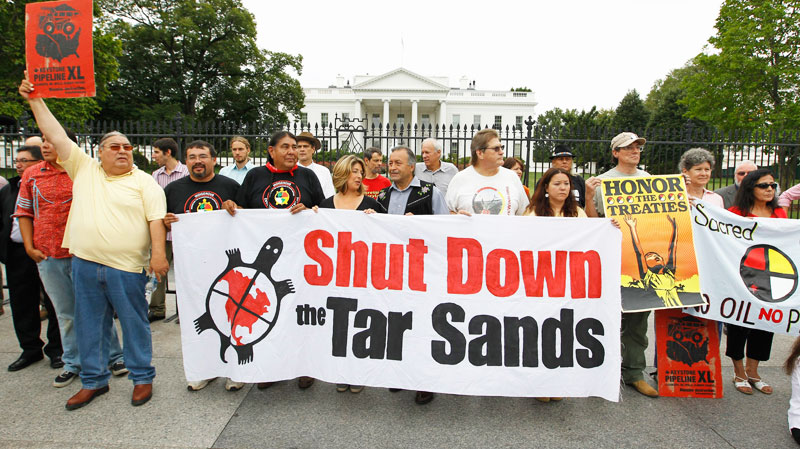
by Deep Green Resistance News Service | Nov 12, 2015 | Strategy & Analysis
by Clay Cochran / Deep Green Resistance
“The woods are lovely, dark and deep,
But I have promises to keep,
And miles to go before I sleep,
And miles to go before I sleep.”
-Robert Frost
President Obama announced Friday morning that he has denied TransCanada’s permit application to build the Keystone XL (KXL) oil pipeline in the U.S. Many in the mainstream environmental movement hailed this as a positive seismic shift in public policy and public perception, and a harbinger of the inevitable saving of our planet. Were it only that simple. Unfortunately, although the denial of the KXL build is in itself a good result, it carries with it some insidious dangers to the continuation of the fundamental work of saving this planet.
It is understandable that many think Obama’s denial of the KXL is a huge victory for the environment. Sadly, that view is myopic, and typical of the wishful thinking hampering the environmental movement around the world. The denial of the KXL does not accomplish what we ultimately need: the shutting down of the entire industrial, fossil-fuel driven society murdering the planet.
Unfortunately, the history of the environmental movement has many incidences where small victories have caused a loss of focus on the big picture, or otherwise misdirected us into falsely believing the one-off accomplishment sufficient to save our planet. Make no mistake, we must be ever vigilant not to let the leaders of industrial civilization (i.e. the greedy, patriarchal, conscious-less ‘leaders of industry’ and their paid-for politicians and mainstream media) characterize the globally suicidal events that are unfolding. They will always use a deceptive framework supporting their relentless need for unsustainable expansion, and lead many into losing sight of the ecologically desperate times that we are facing.
Deep Green Resistance believes the only way our planet can be saved for all species is for the current patriarchal and industrial civilization to be immediately dismantled. We also believe there is grave danger in premature self-congratulation for small accomplishments that seemingly are a win for the environment, but in truth do nothing to alter the existing paradigm of corporate power or slow the inevitable march towards unsustainable expansion and the murder of the planet. Simply stated, the processes that have been put in motion ― runaway climate change, population overshoot due to industrial agriculture, species extinctions, and ‘resource’ extraction ― are far too developed to be stopped by any means that allows the industrial complex to remain in existence.
In the book Deep Green Resistance, co-author Lierre Keith writes
”The culture of the left needs a serious overhaul. At our best and bravest moments, we are the people who believe in a just world; who fight the power with all the courage and commitment that women and men can possess; who refuse to be bought or beaten into submission, and refuse equally to sell each other out. The history of struggles for justice is inspiring, ennobling even, and it should encourage us to redouble our efforts now when the entire world is at stake. Instead, our leadership is leading us astray.”
Our leadership continues to lead us astray. President Obama gives lip service to his concern for global climate change guiding this KXL denial decision, but the truth is hidden in his message. According to a Scientific American article, among his reasons for rejection were that
…the pipeline would not make a meaningful long-term contribution to the U.S. economy, nor would it increase U.S. energy security or help to lower gas prices, which have already declined dramatically over the last year.
With these criteria for making his decision, we’re clearly not ready to take a victory lap for the environmental awakening of the global leadership.
Also in the DGR book, the authors discuss Lester Brown’s Plan B: Mobilizing to Save Civilization, pointing out that “although Mr. Brown is to be [commended] for understanding that the problems our planet is facing are systemic and interrelated, [his plan] unfortunately falls prey to what many other ‘plans’ do; it leaves the overlapping accelerants of capitalism, industrialization, and civilization in place.”
With the KXL decision in the news, it is critical to keep in mind the myriad disastrous ‘projects’ which continue unabated. As the DGR authors warn, these other projects evidence the hard truth that, so far, the work of the environmental movement has indeed left capitalism, industrialization, and civilization firmly in place. That three-headed monster has no intention of voluntarily leaving us to salvage what is left of our biosphere, so we are left with no other alternative than to terminate it ourselves, and with extreme prejudice.
A recent article in the Financial Post states:
While TransCanada Corp. has been cooling its heels on its Keystone XL proposal for the past six years, the oil pipeline business has been booming in the United States. Crude oil pipeline mileage rose 9.1 per cent last year alone to reach 66,649 miles. […] Between 2009 and 2013, more than 8,000 miles of oil transmission pipelines have been built in the past five years in the U.S., […] compared to the 875 miles TransCanada wants to lay in the states of Montana, South Dakota and Nebraska for its 830,000-bpd project. By last year, the U.S. had built 12,000 miles of pipe since 2010.
[AOPL spokesperson John Stoody said] “While people have been debating Keystone in the U.S. we have actually built the equivalent of 10 Keystones. And no one’s complained or said anything.”
A Climate Central article discusses the many alternative plans already developed to transport the tar sands of Canada:
As a way around those challenges, other pipelines are in the works. One pipeline is already operating and sending hundreds of thousands of barrels of tar sands bitumen to Texas every day.
Experts, such as Stephen Kelly, a former U.S. diplomat and a visiting professor of public policy and Canadian studies at Duke University, say that the long-term outlook for Canadian oil sands production is not closely linked to the fate of Keystone XL.
“Canada has ample financial incentive to find ways to get its oil to world markets, and it’s likely to find ways to build pipelines to its coast, despite opposition,” he said last year.
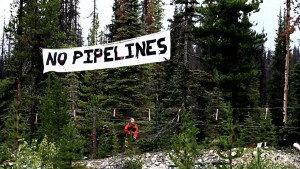 The Keystone XL decision and its accompanying self-congratulations should be a warning to us all not to lose sight of the big picture. The Keystone XL alternatives do face opposition in Canada from overlapping groups of climate activists, grassroots environmentalists concerned about local impacts, and First Nations peoples, with the Unis’tot’en Camp a prime example of a coalition for active on-the-ground resistance. We must remain vigilant in fighting pipelines and other infrastructure expansion projects wherever they’re proposed, and be skeptical of any misdirection from the fundamental work of ending the industrial-patriarchal complex.
The Keystone XL decision and its accompanying self-congratulations should be a warning to us all not to lose sight of the big picture. The Keystone XL alternatives do face opposition in Canada from overlapping groups of climate activists, grassroots environmentalists concerned about local impacts, and First Nations peoples, with the Unis’tot’en Camp a prime example of a coalition for active on-the-ground resistance. We must remain vigilant in fighting pipelines and other infrastructure expansion projects wherever they’re proposed, and be skeptical of any misdirection from the fundamental work of ending the industrial-patriarchal complex.
There is some good news. Deep Green Resistance believes that the insanity of the industrial planet-killing machine can be stopped. We believe that a sustainable and just world can be achieved, and we can transition away from being a consumer society. The Deep Green Resistance strategy of Decisive Ecological Warfare (DEW) is a recognition of the scope of what is at stake (the planet); an honest evaluation of the potential for a mass movement (none); and an assessment that industrial civilization depends on highly vulnerable infrastructure.
DEW keeps front-and-center the understanding that there will be no comprehensively successful environmental actions if we allow the current industrial framework to remain in existence. The people in power who are driving 200 species to extinction each day have no qualms about leading humans to the same fate, and show no signs of voluntarily altering their behaviors. It is well past time to make them stop.
I urge you to take a look at the Deep Green Resistance website and to reflect on the future of this planet. The Decisive Ecological Warfare strategy is multifaceted and needs your help, with work to be done wherever your skill set and interests lead you. Get involved and save our home.
If you’d like to read more analysis like this, and news of grassroots resistance to environmental destruction, sign up at the upper left of this page to receive email notifications of new posts.






